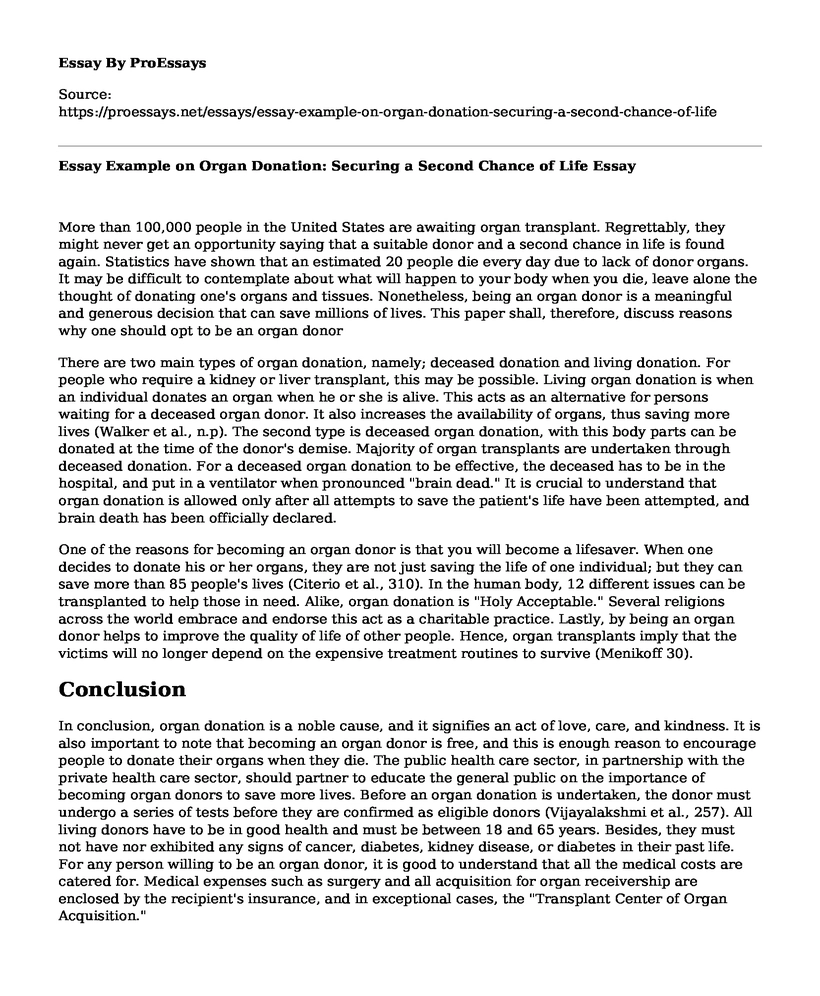More than 100,000 people in the United States are awaiting organ transplant. Regrettably, they might never get an opportunity saying that a suitable donor and a second chance in life is found again. Statistics have shown that an estimated 20 people die every day due to lack of donor organs. It may be difficult to contemplate about what will happen to your body when you die, leave alone the thought of donating one's organs and tissues. Nonetheless, being an organ donor is a meaningful and generous decision that can save millions of lives. This paper shall, therefore, discuss reasons why one should opt to be an organ donor
There are two main types of organ donation, namely; deceased donation and living donation. For people who require a kidney or liver transplant, this may be possible. Living organ donation is when an individual donates an organ when he or she is alive. This acts as an alternative for persons waiting for a deceased organ donor. It also increases the availability of organs, thus saving more lives (Walker et al., n.p). The second type is deceased organ donation, with this body parts can be donated at the time of the donor's demise. Majority of organ transplants are undertaken through deceased donation. For a deceased organ donation to be effective, the deceased has to be in the hospital, and put in a ventilator when pronounced "brain dead." It is crucial to understand that organ donation is allowed only after all attempts to save the patient's life have been attempted, and brain death has been officially declared.
One of the reasons for becoming an organ donor is that you will become a lifesaver. When one decides to donate his or her organs, they are not just saving the life of one individual; but they can save more than 85 people's lives (Citerio et al., 310). In the human body, 12 different issues can be transplanted to help those in need. Alike, organ donation is "Holy Acceptable." Several religions across the world embrace and endorse this act as a charitable practice. Lastly, by being an organ donor helps to improve the quality of life of other people. Hence, organ transplants imply that the victims will no longer depend on the expensive treatment routines to survive (Menikoff 30).
Conclusion
In conclusion, organ donation is a noble cause, and it signifies an act of love, care, and kindness. It is also important to note that becoming an organ donor is free, and this is enough reason to encourage people to donate their organs when they die. The public health care sector, in partnership with the private health care sector, should partner to educate the general public on the importance of becoming organ donors to save more lives. Before an organ donation is undertaken, the donor must undergo a series of tests before they are confirmed as eligible donors (Vijayalakshmi et al., 257). All living donors have to be in good health and must be between 18 and 65 years. Besides, they must not have nor exhibited any signs of cancer, diabetes, kidney disease, or diabetes in their past life. For any person willing to be an organ donor, it is good to understand that all the medical costs are catered for. Medical expenses such as surgery and all acquisition for organ receivership are enclosed by the recipient's insurance, and in exceptional cases, the "Transplant Center of Organ Acquisition."
Works Cited
Citerio, Giuseppe, et al. "Organ donation in adults: a critical care perspective." Intensive care medicine 42.3 (2016): 305-315.
Menikoff, Jerry. "The importance of being dead: non-heart-beating organ donation." Organ and Tissue Transplantation. Routledge, 2017. 13-30.
Vijayalakshmi, Poreddi, et al. "Knowledge, attitude and behaviour of the general population towards organ donation: an Indian perspective." The National medical journal of India 29.5 (2016): 257.
Walker, Martin, and Magi Sque. "Organ donation: Who, when, how?." IPR, 2017.
Cite this page
Essay Example on Organ Donation: Securing a Second Chance of Life. (2023, Feb 11). Retrieved from https://proessays.net/essays/essay-example-on-organ-donation-securing-a-second-chance-of-life
If you are the original author of this essay and no longer wish to have it published on the ProEssays website, please click below to request its removal:
- Paper Sample: Synthetic Marijuana and the Harm It Is Causing to Society
- Paper Example on HIV Disclosure Law in Australia
- Research Paper on Respiratory Infections
- Essay Sample on Hospital Versus Home Births
- Essay Example on Fast Food in Hospitals: Pros & Cons
- Research Paper on Bats & Viruses: The Spillover Effect & Coronavirus
- Essay Example on Food Epidemiology







